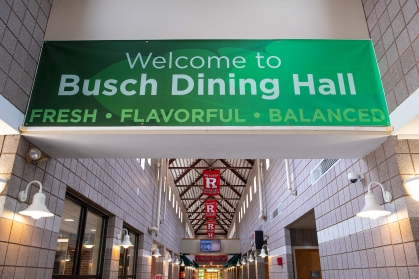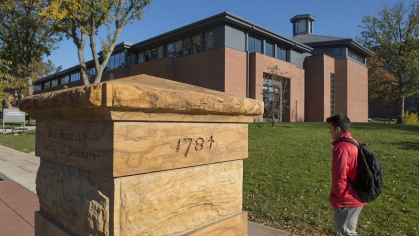
Rutgers Dining Services has spearheaded sustainable initiatives in the food service industry for generations. Its work in this field began long ago, when a farmer used a horse and wagon to pick up food waste along College Avenue that he would use as fertilizer. While that farmer has long since stopped collecting food waste, the sustainable work of Rutgers Dining Services continues to this day.
The sustainable management of food, if done correctly, can reduce food waste at every step, from production to recovery. The Environmental Protection Agency defines sustainable management of food as “a systematic approach that seeks to reduce wasted food and its associated impacts over the entire life cycle.”
With this approach in mind, despite serving thousands of students three meals a day during the semester, Dining has ensured the four New Brunswick dining halls and all Rutgers catering events produce only about 3,200 pounds of food waste per weekday. This includes both pre-production (e.g., vegetable parings and trimmings, contaminated or spoiled food, etc.) and post-production waste (food taken by customers but not consumed).
While some waste is food a student doesn’t finish, some is unavoidable, such as bones and fruit peels, and contributes to Dining’s daily waste totals. The objective of reducing food waste prompted Dining’s decision to go trayless at all dining halls in 2014, and food waste has since declined between 14 and 22 percent per dining hall.
In addition, aerobic digesters have helped to dispose of any waste that Dining does have in an environmentally conscious manner. Since 2013, these digesters have been used at the Busch Dining Hall, the Neilson Dining Hall and Henry’s Diner. Digesters have also been installed more recently at Brower Commons and Busch Dining Hall, and digesters will be installed at Livingston Dining Commons by the end of August.
Dining also reduces waste by efficiently producing daily quantities of food for students visiting the dining halls. The department continually revises their menus based on the amount of each item that students consume and the amount of waste produced. If any extra wholesome, edible foods remain at the end of the day, they are delivered to reputable agencies that serve those in need such as the New Life Food Pantry and the Rutgers Student Food Pantry. By redirecting these extra portions to these agencies, Dining supports local community feeding programs and reduces its environmental impact.
With an eye towards reducing that same environmental impact, as part of the Menus of Change initiative and a leading member of the Menus of Change University Research Collaborative, Dining understands that food choices impact not only students’ health but the planet. 81% of its food sourcing and purchasing is local (within a 250-mile radius of the New Brunswick campus), including 100% of produce, 65% of meat & poultry, and 51% of seafood.
However, sustainability is not just directly related to food sourcing, preparation, and waste. There are other sustainable initiatives that Dining has and continues to implement.
In 2019, as part of Dining’s commitment to sustainability and in collaboration with Rutgers University Student Assembly (RUSA), Dining removed cups, lids, straws and plastic bags from dining hall takeout facilities, instead providing meal plan holders with a reusable bottle and bag. Dining has consulted with other universities and urged them to introduce the same sustainable practices, and, additionally, has switched to energy-efficient LED lighting, uses a VegaWatt generator that turns discarded vegetable oil into energy, and tracks food-related greenhouse gas emissions to reduce their overall carbon footprint.
Dining is always open to input from the Rutgers community and offers many ways for students to ask questions and make suggestions. Many menu changes and operational practices adopted over the years have been prompted by student feedback through Dining’s Student Advisory Board, RUSA, email and napkin boards.
These napkin boards, one of students’ favorite ways to give feedback, allow students to anonymously write their ideas and questions on napkins and post them on cork boards at each dining hall. Dining hall managers will respond to the questions and suggestions, and bring them to the attention of our leadership team. Students may also contact Dining’s executive director’s office by using the Contact Us feature on Dining Services’ website or directly messaging them on their Facebook, Twitter or Instagram accounts.
Outside of Rutgers, Dining has also been a leader in sustainability in New Jersey and nationwide. Dining staff members led nationwide committees on recycling and sustainability as early as 1989, and their work has included chairing the National Association of Collegiate University Food Service’s inaugural Recycling Committee, as well as serving on the Rutgers University President’s Task Force on Carbon Neutrality and as the higher education consultant on food waste legislation for the New Jersey Food Waste Agency.
In short, Rutgers Dining Services has long been a leader in sustainably managing its food, serving good meals to its students, and promoting sustainable practices as part of the university’s overall commitment to a healthier community. For more information on Dining Services' sustainability practices, visit: food.rutgers.edu/sustainability.



